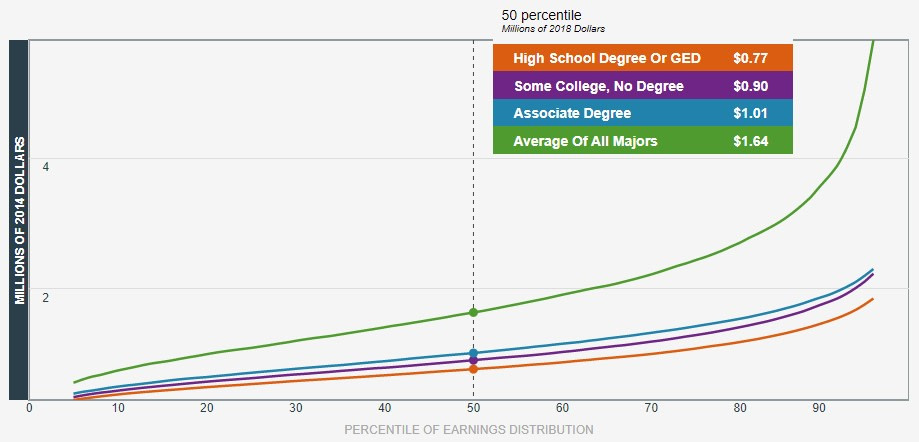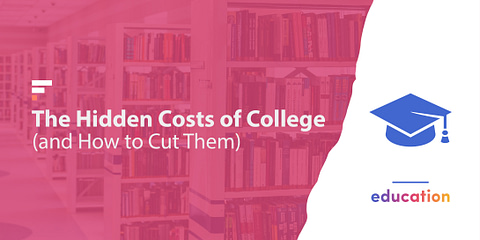If you’re planning your education or your child’s education, you’ll want to consider all options. One of the decisions you’ll need to consider is whether to attend a trade school or college. Both are viable career choices, and both have advantages and disadvantages.
You can have a good and fulfilling life by taking either path. But for right now, with the choice of trade school or college, you need to decide which one is right for you? To make an informed decision, you need to fully understand what each option entails. In order to do that, we will go over the relationship between education and earnings, the differences between trade schools and colleges, and, finally, the pros and cons of each.
A Strong Link Between Education and Earnings
Education has a tremendous impact on your career earning potential. And while today many Americans are starting to doubt the worth of going to college, the studies of lifetime earnings by education level consistently show that college graduates earn more money than associate degree holders or college graduates.

Of course, average lifetime earnings aren’t consistent across all programs. Some college degree holders earn more than others. Some trade school or associate degree graduates earn as much as college graduates.
☝️ You also have to consider costs. Getting a college degree takes four years, sometimes more, and leaves many graduates deeply in debt. If you want to reduce your debt load and get into the workforce faster, a trade program might be your best choice.
Three Kinds of Schools
You’ll be choosing among three different categories of schools. Let’s look at the differences.
- Traditional colleges typically offer a range of four-year degrees. They provide both general education and a specialized major and present significant academic challenges. They may be public, non-profit private, or for-profit private.
- Community colleges typically offer two-year programs. Some of these prepare students for a transfer to a four-year program. Others are trade-focused. Most community colleges are public, and they usually offer a range of trade-focused associate degrees. They usually require some general education courses.
- Trade schools focus entirely on trade-specific certifications. Programs may range from a few months to two years. Most have no general education requirements. Trade schools may be public or private, but many are private for-profit institutions.
Each of these general types has advantages and disadvantages. None is inherently better or worse than the others. Your job is to choose the one that best suits your needs and goals.
Are Trades a Viable Career Options?
Both trade schools and community colleges offer training in the skilled trades. Many people assume that “career” and “college” go together, but many trade programs can lead to well-paid careers. Let’s look at what you can earn with a trade program.
| Trade Job | Median salary (2020) | Job Growth Rate (2019-2029) |
|---|---|---|
| Air Traffic Controller | $130,420 | 1% |
| Elevator and Escalator Installers and Repairers | $88,540 | 7% |
| Radiation therapist | $86,850 | 7% |
| Nuclear Medicine Technologist | $79,590 | 5% |
| Web Developer | $77,200 | 8% |
| Dental Hygienist | $77,090 | 6% |
| Diagnostic Medical Sonographer | $70,380 | 12% |
| Avionics technician | $66,680 | 5% |
| Radiologic and MRI Technologist | $63,710 | 7% |
| Respiratory Therapist | $62,810 | 19% |
| Respiratory Therapist | $62,810 | 19% |
| Occupational Therapy Assistants | $60,950 | 32% |
| Radio and cell tower installer | $57,720 | 4% |
| Computer Support Specialist | $55,510 | 8% |
| Legal Assistant | $52,920 | 10% |
| Medical Equipment Repairer | $51,610 | 5% |
| Physical Therapist Assistant | $49,970 | 26% |
| Broadcast Technician | $47,420 | 9% |
| Agricultural and Food Science Technician | $41,970 | 4% |
| Veterinary Technologist | $36,260 | 16% |
| Preschool Teacher | $31,930 | 2% |
These are median earnings, meaning that individuals may earn more or less, depending on their experience and where they work. The figures still give an idea of what you can do with the right trade-focused education.
Let’s look at some of the pros and cons of each option.
Trade School Pros and Cons
Pros
1. Training in Specific Technical or Mechanical Skills
With a trade school education, you are focused on one thing. Getting this technical training and the certification that comes with it can open up doors to a good job soon after high school.
One thing to note, a certificate in STEM-related trade will generally pay higher than “blue-collar” trades. Many of the best-paid trade careers are in medical fields, like radiation therapy, dental hygienist, or respiratory therapy.
2. Get Into the Workforce More Quickly
If you are looking to get training and get into the workforce, trade school has a definite advantage. A certificate program can last as little as a few months, up to 2 years for some certifications and associate degrees.
3. Lower Cost than College Education
Money is a big factor in any discussion about the pros and cons of trade school vs. college. The time spent earning certification rather than a 4-year degree also translates into lower costs. On average, a trade school education costs roughly $33,000[1]. That’s about what you would pay for one year at many traditional colleges.
Cons
1. Lower Earning Potential
While there are some professions where you can definitely earn a great living, overall the yearly and lifetime earning potential still favors a college degree.
A recent Georgetown University study finds that the overall earning potential changes by roughly $20,000 increments depending on education. So a graduate degree will earn you, on average, around $80,000. A bachelor’s degree will earn $62,000, and some college to an associates degree will usually earn $42-47K.
2. Fewer Job Options
Trade schools usually train you to do one thing very well. That is great, but if that job category goes away or you get tired of doing that one thing, your options become limited. A bachelor’s degree can prepare you for a wider variety of jobs and give you more options for career changes.
3. Not Always Cheaper
Tech schools can cost more than you think. Trade schools and for-profit colleges often treat education as a product and the cost of that product does not always pay off with the training you need to earn back what you put into the training.
If you’re considering a program at a for-profit trade school you should investigate the program carefully. Make sure that the program is well regarded by employers and that the graduates have a good employment rate.
Community College Pros and Cons
Pros
1. Affordability and Convenience
Community colleges are usually publicly funded and many offer very reasonable tuition. There are current proposals to make community college free! They are typically easily accessible and many offer flexible schedules that allow students to work and study at the same time.
2. A Variety of Programs
Many community colleges offer both academic and trade courses, so you can take a few from each category and get a better sense of the direction you want to take. Many high school graduates really aren’t sure where their true inclinations lie, and getting a taste of two options can help them make a better choice.
3. More General Education
Many community colleges require some general education courses, which means you get a solid trade credential and enough broader education to give you more job options down the line.
Cons
1. Less Hands On Work
Many community college trade programs have a more theoretical approach than equivalent trade schools. Trade schools may offer a more hands-on approach that gives more direct work experience.
2. More Time
The general education offered by community colleges may make you a better-rounded person and open up more job options, but it also means spending more time in school. Community college trade programs may take more time to complete than an equivalent trade school certification. Most community college programs take 2 years to complete; many trade school programs can be finished in a year or less.
3. Lower Completion Rates
The convenience offered by flexible schedules and the low cost of community college are advantages, but many students who work and study at the same time end up not finishing their program of study. One study of completion rates found that less than 40% of students did not complete a degree or certificate program within six years. Trade schools have significantly higher completion rates.
College Pros and Cons
Pros
1. Earning Potential
It is still definitely true that your earning potential is higher with a graduate or bachelor’s degree. But if you are mainly concerned about earning potential, your major matters. STEM and business majors are statistically going to out-earn their social science and liberal arts counterparts.
2. Many Jobs Require College Degrees
Like it or not, jobs still often require a college degree. There was a Georgetown University study that showed fully 99% of job growth between the years 2010 and 2016 were for jobs that required an associate’s degree or higher[2].
3. Better Health and Longevity Outcomes
Here’s a stark reality: A college education is better for your health. This is born out in terms of a few factors. Jobs requiring college degrees are more likely to offer better health insurance and retirement plans. They are less likely to expose workers to on-the-job hazards or pollutants. The results are hard to overlook. A peer-reviewed study by Carnegie Mellon found that a college degree was linked to lower blood pressure[3]. College grads are less likely to smoke, more likely to get regular exercise, and less likely to be obese. Bottom line: college graduates live about six years longer on average than high school graduates.
Cons
1. High Costs and Debt
The cost of college has risen dramatically over the past generation. Since 1980, the cost of college tuition and fees has risen an eye-popping 1,200%[4]. Private undergraduate tuition and fees in 1980 averaged just over $10,000 per year nationwide. In 2020, that number had jumped to $34,000 per year. Not to mention various hidden costs of college that are not included in the tuition. It’s no wonder the phrase “student debt crisis” has entered the lexicon over the past several years.
So instead of leaving college with a few thousand dollars of debt, that debt has risen into the tens of thousands. Here is the hard truth about college debt, by the numbers:
- Overall, student debt in the US in 2020 was $1.56 trillion
- Total U.S. Borrowers With Student Loan Debt: 44.7 million
- Average Student Loan Debt: $32,731
- Average Monthly Student Loan Payment: $393
- Median Student Loan Debt: $17,000
Debt and cost may be significant obstacles to a traditional college education. There are ways in which you can get a college degree without burying yourself in unmanageable debt. If you’re really committed to a career that requires a college education, it’s probably worth the cost. If you’re not, you may want to consider another option.
2. Postponed Adult Milestones
Twenty-somethings still living with their parents is a laugh-line, but it’s a reality many families face these days. Debt sometimes requires college grads to live with parents, and postpone other adult milestones like getting married, having children of your own, etc.
Some of this can be smart financial decision-making, but if you want to get on with life, but you just can’t afford it, that points to a bigger problem with the societal costs of higher education.
3. Demanding Academic Requirements
College requires challenging academic work, including highly theoretical studies. You will be required to complete coursework outside your chosen field. If you’re academically inclined that isn’t a problem, but for some students the academic side of college can be a real challenge. Some people are just more comfortable in a hands-on skill-focused job.
Key Questions to Ask Yourself When Deciding Between Trade School and College
If you’re considering these options you’ll need to look at all of the factors discussed above. You’ll also have to consider the most important factor of all: your own needs and desires. Start by asking yourself these questions.
- Are you prepared to commit to a career? If you are ready and you believe a trade career is appropriate for you, a trade school or a community college trade program might be your best option.
- Do the career options offered in trade programs really appeal to you? The trades offer many well paid career options, but they aren’t right for everyone. Think seriously before making a commitment.
- Are you prepared to face the academic load of a traditional college? The academic life also isn’t right for everyone. If you struggle with abstract or theoretical academic work a trade program might be ideal for you.
- How much debt are you prepared to take on? College is expensive and often involves high debt levels. The investment pays off but it sometimes takes time and debt levels can surge due to interest. Are you ready for that commitment?
- What’s your priority: reliable work or personal growth? Many people attend college not only to boost career prospects, but to expand their knowledge and horizons. Is that what you’re after, or is a paying job more important?
There are no right or wrong answers to these questions. They are meant to help you clarify your objectives and make the choice that will best suit you.











